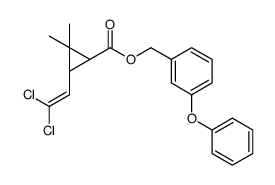CHEMICAL IDENTIFICATION
-
RTECS NUMBER :
-
GZ1257000
-
CHEMICAL NAME :
-
Cyclopropanecarboxylic acid, 3-(2,2-dichlorovinyl)-2,2-dimethyl-, (3-phenoxyphenyl) methyl ester, (1R-cis)-
-
CAS REGISTRY NUMBER :
-
54774-45-7
-
LAST UPDATED :
-
199612
-
DATA ITEMS CITED :
-
6
-
MOLECULAR FORMULA :
-
C21-H20-Cl2-O3
-
MOLECULAR WEIGHT :
-
391.31
HEALTH HAZARD DATA
ACUTE TOXICITY DATA
-
TYPE OF TEST :
-
LD50 - Lethal dose, 50 percent kill
-
ROUTE OF EXPOSURE :
-
Oral
-
SPECIES OBSERVED :
-
Rodent - mouse
-
DOSE/DURATION :
-
85 mg/kg
-
TOXIC EFFECTS :
-
Behavioral - tremor Behavioral - excitement Behavioral - ataxia
-
REFERENCE :
-
EVHPAZ EHP, Environmental Health Perspectives. (U.S. Government Printing Office, Supt of Documents, Washington, DC 20402) No.1- 1972- Volume(issue)/page/year: 14,15,1976
-
TYPE OF TEST :
-
LD50 - Lethal dose, 50 percent kill
-
ROUTE OF EXPOSURE :
-
Intraperitoneal
-
SPECIES OBSERVED :
-
Rodent - mouse
-
DOSE/DURATION :
-
1 gm/kg
-
TOXIC EFFECTS :
-
Behavioral - excitement Behavioral - ataxia Gastrointestinal - changes in structure or function of salivary glands
-
REFERENCE :
-
EVHPAZ EHP, Environmental Health Perspectives. (U.S. Government Printing Office, Supt of Documents, Washington, DC 20402) No.1- 1972- Volume(issue)/page/year: 21,285,1977
-
TYPE OF TEST :
-
LD50 - Lethal dose, 50 percent kill
-
ROUTE OF EXPOSURE :
-
Subcutaneous
-
SPECIES OBSERVED :
-
Amphibian - frog
-
DOSE/DURATION :
-
140 ug/kg
-
TOXIC EFFECTS :
-
Behavioral - tremor Behavioral - excitement Behavioral - ataxia
-
REFERENCE :
-
PCBPBS Pesticide Biochemistry and Physiology. (Academic Press, Inc., 1 E. First St., Duluth, MN 55802) V.1- 1971- Volume(issue)/page/year: 20,217,1983 *** REVIEWS *** IARC Cancer Review:Animal Inadequate Evidence IMEMDT IARC Monographs on the Evaluation of Carcinogenic Risk of Chemicals to Man. (WHO Publications Centre USA, 49 Sheridan Ave., Albany, NY 12210) V.1- 1972- Volume(issue)/page/year: 53,329,1991 IARC Cancer Review:Human No Available Data IMEMDT IARC Monographs on the Evaluation of Carcinogenic Risk of Chemicals to Man. (WHO Publications Centre USA, 49 Sheridan Ave., Albany, NY 12210) V.1- 1972- Volume(issue)/page/year: 53,329,1991 IARC Cancer Review:Group 3 IMEMDT IARC Monographs on the Evaluation of Carcinogenic Risk of Chemicals to Man. (WHO Publications Centre USA, 49 Sheridan Ave., Albany, NY 12210) V.1- 1972- Volume(issue)/page/year: 53,329,1991
|


